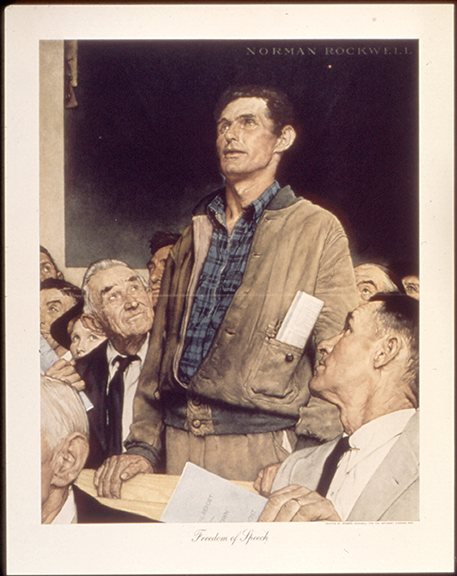
Ben Eaton, Mary Schaeffer, Esther Calhoun, and Ellis Long (from left to right) successfully asked courts to dismiss the defamation lawsuit brought against them for speaking out about pollution in their town. (ACLU)
In June 2016, four Alabama citizens asked their state courts to dismiss a defamation lawsuit brought against them for criticizing the operations of a waste disposal company.
The courts agreed with the motion to dismiss in February, 2017.
The initial lawsuit was filed April 2016 by the owners of a Uniontown, Alabama waste dump, who alleged that the four citizens had hurt their reputation when they criticized the dump in statements to the media and on their Black Belt Citizens Facebook page.
Among the things that Eaton, Schaeffer, Calhoun and Long said about the landfill that allegedly harmed Green Group Holdings (according to their court filings):
1. I feel like I’m in prison, we’re suffocated by toxic pollution and extreme poverty. Where are my freedoms? This is an environmental injustice & it’s happening in Uniontown and everywhere. Its a landfill, its a tall mountain of coal ash and it has affected us. It affected our everyday life. It really has done a lot to our freedom. Its another impact of slavery.
2. Cause we are in a black residence, things change? And you can’t walk outside. And you can not breathe. I mean, you are in like prison. I mean, its like all your freedom is gone. As a black woman, our voices are not heard. EPA hasn’t listened and ADEM has not listened. Whether you are white or black, rich or poor, it should still matter and we all should have the right to clean air and clean water. I want to see EPA do their job.3. We are tired of being taken advantage of in this community. The living around here can’t rest because of the toxic material from the coal ash leaking into creeks and contaminating the environment, and the deceased can’t rest because of desecration of their resting place.
Green Group Holdings says it its complaint (p. 11 -12) that these and other statements are made “with malice by intentional action or with reckless disregard for the truth.”
“By portraying Arrowhead Landfill as a facility that is a corrupt, intentional polluter of the Uniontown community that also desecrates cemeteries and is intentionally preying on that community to the extent that it calls to mind slavery times and false imprisonment, the Defendants have through the national and international publication of such sensational and defamatory (though false) allegations permanently injured and damaged the business and reputation of Plaintiffs.”
The ACLU’s argument is that these statements are rhetoric and hyperbole, well within the “breathing room” that is needed for the kind of full, robust discussion of public issues that is protected by the First Amendment.
These are not statements of fact that the company can prove to be false, the ACLU says. (See p. 12 of the response). For example the words “toxic” and “contaminating” should not be taken in context as a literal assertion of scientific or legal fact. “To conclude otherwise would be to stifle Eaton’s ability to engage in the political rhetoric that is at the core of the First Amendment’s protections.” (See p. 18 of the response).
On p. 19, the ACLU notes that Green Group Holdings is legally a public entity and that the Sullivan “actual malice” standard applies. “… Public officials and public figures cannot recover for defamation without showing that the defamatory statement “was made with ‘actual malice, that is, with knowledge that it was false or with reckless disregard of whether it was false or not.”
Background on the lawsuit
The lawsuit was preceded by an interesting offer to “settle” if Eaton, Schaeffer, Calhoun and Long would agree to drop complaints of environmental racism to the EPA, never speak out against them again, and turn over all their passwords and internet correspondence with others about the waste dump. After they refused, Green Group holdings went ahead with the suit.
This kind of legal action is called a SLAPP — a strategic lawsuit against public participation — and 30 other states have some form of protection against it. Alabama does not, but in its brief asking for the suit to be dismissed, the American Civil Liberties Union noted that the lack of SLAPP protection in state law does not mean that citizens lose First Amendment protections from the US Constitution.

Coal ash surrounds this house in Kingston, TN, following the December, 2008 TVA disaster. The ash from coal-fired electric power plants contains large amounts of arsenic, lead, mercury, selenium and chromium and other toxic and hazardous chemicals. Ash from the spill has been moved to the Uniontown AL waste dump at the heart of this defamation lawsuit.
The waste dump is particularly controversial because it is handling coal ash that is loaded with carcinogens and toxic chemicals Tennessee Valley Authority’s Kingston coal ash disaster of 2008. Dumping the ash in a predominantly African-American region has been controversial from the beginning.
A similar SLAPP CASE
Also around 2017, an oil company sued Greenpeace for defamation, racketeering and conspiracy in trying to block the Dakota pipeline. The case, ETP v Greenpeace, was dismissed by a federal court in 2019.
Greenpeace continues to base some of its fund-raising appeals around the case.
Also see: Texas Monthly article from 2017.

